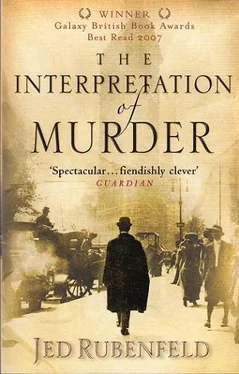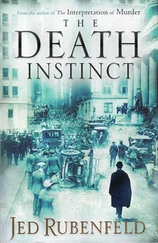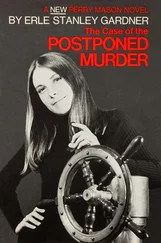Jed Rubenfeld - The Interpretation of Murder
Здесь есть возможность читать онлайн «Jed Rubenfeld - The Interpretation of Murder» весь текст электронной книги совершенно бесплатно (целиком полную версию без сокращений). В некоторых случаях можно слушать аудио, скачать через торрент в формате fb2 и присутствует краткое содержание. Жанр: Исторические приключения, на английском языке. Описание произведения, (предисловие) а так же отзывы посетителей доступны на портале библиотеки ЛибКат.
- Название:The Interpretation of Murder
- Автор:
- Жанр:
- Год:неизвестен
- ISBN:нет данных
- Рейтинг книги:5 / 5. Голосов: 1
-
Избранное:Добавить в избранное
- Отзывы:
-
Ваша оценка:
- 100
- 1
- 2
- 3
- 4
- 5
The Interpretation of Murder: краткое содержание, описание и аннотация
Предлагаем к чтению аннотацию, описание, краткое содержание или предисловие (зависит от того, что написал сам автор книги «The Interpretation of Murder»). Если вы не нашли необходимую информацию о книге — напишите в комментариях, мы постараемся отыскать её.
The Interpretation of Murder — читать онлайн бесплатно полную книгу (весь текст) целиком
Ниже представлен текст книги, разбитый по страницам. Система сохранения места последней прочитанной страницы, позволяет с удобством читать онлайн бесплатно книгу «The Interpretation of Murder», без необходимости каждый раз заново искать на чём Вы остановились. Поставьте закладку, и сможете в любой момент перейти на страницу, на которой закончили чтение.
Интервал:
Закладка:
Which is why I kept coming back to Hamlet and to Freud's irresistible but infuriating solution to its riddle. In two sentences, Freud had demolished the long-standing notion that Hamlet was, as Jung's 'great-grandfather' Goethe had it, the overly intellectual aesthete, constitutionally incapable of resolute action. As Freud pointed out, Hamlet repeatedly takes decisive action. He kills Polonius. He plans and executes his play-within-a-play, tricking Claudius into revealing his guilt. He sends Rosencrantz and Guildenstern to their deaths. Apparently there is just one thing he cannot do: take vengeance on the villain who killed his father and bedded his mother.
And the reason, Freud says, the real reason, is simple. Hamlet sees in his uncle's deeds his own secret wishes realized: his Oedipal wishes.
Claudius has done only what Hamlet himself wanted to do. 'Thus the loathing which should drive him on to revenge' — to quote Freud — 'is replaced in him by self- reproaches, by scruples of conscience.' That Hamlet suffers from self-reproach is undeniable. Over and over, he castigates himself — excessively, almost irrationally He even contemplates suicide. Or at least that is how the To be, or not to be speech is always interpreted. Hamlet is wondering whether to take his own life. Why? Why does Hamlet feel guilty and suicidal when he thinks of avenging his father? No one in three hundred years had ever been able to explain the most famous soliloquy of all drama — until Freud.
According to Freud, Hamlet knows — unconsciously — that he himself wished to kill his father and that he himself wished to replace his father in his mother's bed, just as Claudius has done. Claudius is, therefore, the embodiment of Hamlet's own secret wishes; he is a mirror of Hamlet himself. Hamlet's thoughts run straight from revenge to guilt and suicide because he sees himself in his uncle. Killing Claudius would be both a reenactment of his own Oedipal desires and a kind of self-slaughter. That is why Hamlet is paralyzed. That is why he cannot take action. He is an hysteric, suffering from the overwhelming guilt of Oedipal desires he has not successfully repressed.
And yet, I felt, there must be some other explanation. There must be another meaning of To be, or not to be. If I could only solve that soliloquy, I somehow imagined it would vindicate my objection to the entire Oedipus theory. But I never had.
At breakfast, I found Brill and Ferenczi at the same table they had occupied yesterday. Brill was manfully assaulting a plate of steak and eggs. Ferenczi was not so hale: he insisted he was not going to touch a crumb all day. Both seemed a little forced in their conversation with me; I think I had interrupted them in private talk. 'The waiters,' said Ferenczi, 'they are all Negro. Is that common in America?'
'Only in the better establishments,' replied Brill. 'New Yorkers opposed emancipation, don't forget, until they realized what it meant: they would get to keep their blacks as servants, only it would cost them less.'
'New York did not oppose emancipation,' I put in.
'A riot is not opposition?' asked Brill.
Ferenczi said, 'You must ignore him, Younger, really you must.'
'Yes, ignore me,' Brill responded. 'Everyone does. Instead, we must attend solely to Jung, because he is "more important than the rest of us put together." '
I saw that Jung had been their topic before I appeared. I asked if they could give me a clearer sense of Jung's relationship to Freud. They did.
Quite recently, over the last two years, Freud had attracted a new set of Swiss followers. Jung was the most prominent. The Zurichers were resented by Freud's original Viennese disciples, whose jealousy had intensified when Freud made Jung editor in chief of the Psychoanalytical Yearbook, the first periodical in the world devoted to the new psychology. In this position, Jung had the power to rule on the merits of everyone else's work. The Viennese objected that Jung had not genuinely embraced the 'sexual aetiology' — Freud's core discovery that repressed sexual wishes lie behind hysteria and other mental illnesses. They felt Jung's elevation demonstrated favoritism on Freud's part. Here, Brill told me, the Viennese were righter than they knew. Freud not only favored Jung but had already selected him as his 'crown prince' and 'heir' — the man who would take over the movement.
I didn't mention having already heard Freud make this very statement to Jung last night, principally because I would then have had to describe Freud's mishap. Instead, I observed that Jung seemed highly sensitive to Freud's opinion of him.
'Oh, we all are,' Ferenczi answered. 'But, not to question, Freud and Jung have very father-son relations. I saw them myself on the ship. Hence Jung is very sensitive to any rebuke. It enrages him. Especially about the transference. Jung has — how shall I say? — a different philosophy when it comes to transference.'
'Really? Has he published it?' I asked.
Ferenczi exchanged a look with Brill. 'Not exactly. I am speaking of his approach to his patients. His — ah — female patients. You understand.'
I was beginning to.
Brill whispered, 'He sleeps with them. He is notorious.'
'Myself, I have never,' said Ferenczi. 'But I have not yet faced too many temptations, so congratulations in my case are sadly premature.'
'Does Dr Freud know?'
This time Ferenczi whispered, 'One of Jung's patients wrote to Freud, most upset, describing everything. Freud showed me letters on the ship. There is even a letter from Jung to the girl's mother — very peculiar. Freud consulted me for guidance.' Ferenczi was distinctly proud of this. 'I told him he should not take the girl's word as proof. Of course I already knew all about it. Everyone does. A beautiful girl — Jewish — a student. They say Jung did not treat her well.'
'Oh, no,' said Brill, looking at the entryway to the breakfast room. Freud was on his way in, but not by himself. He was accompanied by another man, whom I had met in New Haven at the psychoanalytic congress there a few months ago. It was Ernest Jones, Freud's British follower.
Jones had come to New York to join our party for the week. He would then travel up to Clark with us on Saturday. About forty, Jones was as short as Brill but a little stouter, with an exceedingly white face, dark well-oiled hair, almost no chin, and a tight, thin-lipped smile more suggestive of self-satisfaction than amiability. He had the peculiar habit of looking away from a person while addressing him. Freud, who was joking with Jones as they approached our table, was plainly delighted to see him. Neither Ferenczi nor Brill appeared to share this sentiment.
'Sandor Ferenczi,' said Jones. 'What a surprise, old fellow. But you weren't invited, were you? By Hall, I mean, to give a paper at Clark?'
'No,' answered Ferenczi, 'but — '
'And Abraham Brill,' Jones went on, casting his eyes about the room as if expecting to find others he knew. 'How are we getting on? Still only three patients?'
'Four,' said Brill.
'Well, count yourself lucky, old man,' replied Jones. 'I am so crawling with patients in Toronto I don't have a minute to put pen to paper. No, all I have in the pipeline is my handwriting piece for Neurology, a little thing for Insanity, and the lecture I gave at New Haven, which Prince wants to publish. What about you, Brill, anything coming out?'
Jones's remarks had produced an atmosphere less than convivial. Brill assumed an expression of feigned disappointment. 'Only Freud's hysteria book, I'm afraid,' he said.
Jones's lips worked, but nothing came out.
'Yes, only my translation of Freud,' Brill went on. 'My German was rustier than I would ever have believed, but it's done.'
Relief filled Jones's countenance. 'Freud doesn't need translating into German, you sod,' he said, laughing out loud. 'Freud writes in German. He needs an English translator.'
Читать дальшеИнтервал:
Закладка:
Похожие книги на «The Interpretation of Murder»
Представляем Вашему вниманию похожие книги на «The Interpretation of Murder» списком для выбора. Мы отобрали схожую по названию и смыслу литературу в надежде предоставить читателям больше вариантов отыскать новые, интересные, ещё непрочитанные произведения.
Обсуждение, отзывы о книге «The Interpretation of Murder» и просто собственные мнения читателей. Оставьте ваши комментарии, напишите, что Вы думаете о произведении, его смысле или главных героях. Укажите что конкретно понравилось, а что нет, и почему Вы так считаете.












